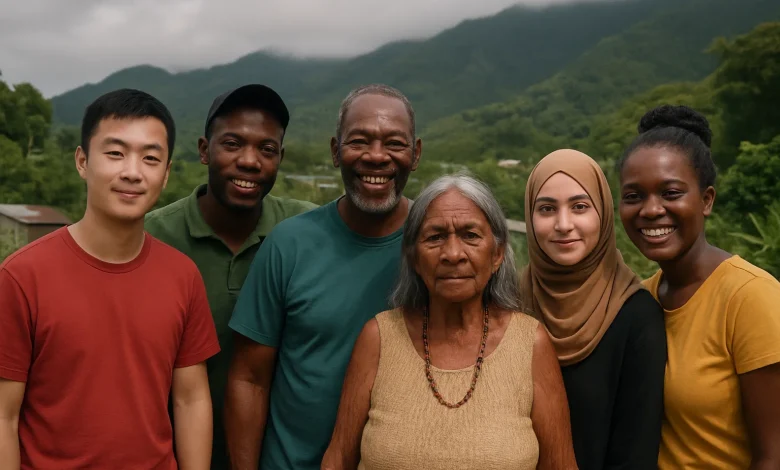Citizen of Dominica

A citizen of Dominica is a person who, under the laws of the Commonwealth of Dominica, possesses legal nationality and the rights and responsibilities that accompany it. Citizenship confers constitutional protections, access to national services, and political participation in one of the Eastern Caribbean’s sovereign democratic states. It may be acquired by birth, descent, registration, or naturalisation, each governed by the Citizenship Act of Dominica and further shaped by policies such as the Citizenship by Investment Regulations and the Citizenship Regulations of 1979.
Dominica’s Legal Definition of a Citizen
In the context of Dominica’s Constitution, citizens are those who either were born in Dominica before independence or whose parent or grandparent was born in Dominica. The law also recognizes as citizens those who were granted status through lawful naturalisation, registration (typically through marriage or residency), or economic citizenship schemes. Under the Citizenship Act of Dominica, a citizen enjoys full civil liberties, including voting rights, the ability to hold public office, and diplomatic protection abroad.
The Constitution also lays the groundwork for protecting against statelessness. Persons born in Dominica who would otherwise be stateless are automatically granted citizenship under certain circumstances, in alignment with international human rights conventions to which Dominica is a party.
Citizenship by Birth, Descent, and Registration in Dominica
Citizenship by birth applies to anyone born in Dominica unless their parents were foreign diplomats or enemy aliens during wartime. Citizenship by descent is extended to individuals born abroad to at least one Dominican parent. In cases of registration, individuals married to Dominican nationals or long-term residents may apply through the Ministry of National Security and Legal Affairs.
Citizenship may be revoked by an official Citizenship Deprivation Order if the individual is found to have acquired status through fraud or disloyalty. These provisions are enforced by the Registrar of the High Court and reviewed through the Court of Appeal in Dominica, depending on the legal pathway pursued.
The Role of Citizenship in National Development
Dominican citizenship is deeply tied to participation in national growth. Citizens are eligible for various government initiatives such as the National Apprenticeship Programme, Youth Economy Programme, and educational access through institutions supported by the National Training Agency. They also have a role in shaping the political system, including voting in members of the Eleventh Parliament of Dominica or benefiting from programs initiated in the Budget Debate in Dominica.
Additionally, citizens form the legal base for Dominica’s engagement in regional structures such as CARICOM free movement, allowing skilled nationals to travel, live, and work across member states, in support of the CARICOM Single Market and Economy (CSME).
Citizenship and Economic Strategy
Dominica is one of the few countries that operates a well-regulated investment-based naturalisation programme. Under the Citizenship by Investment Regulations, foreigners can acquire citizenship in exchange for contributing to national development projects, typically in housing, education, or healthcare. These policies have been central to Dominica’s foreign revenue generation strategy, boosting industries including construction and tourism.
Unlike traditional naturalisation routes, economic citizenship does not require long-term residence. However, applicants must pass due diligence checks and cannot be granted status if associated with criminal activity. The program has garnered international attention for its rigorous vetting process, transparency, and role in enabling post-disaster recovery and climate-resilient development.
Civic Duties and Identity
Citizenship in Dominica is both a legal status and a lifelong relationship with the state that carries duties, entitlements, and expectations. Citizens are not merely passive holders of rights, they are active contributors to national development, community stability, and the democratic process.
Dominican citizens are required to comply with laws and policies as defined by the Revised Laws of Dominica, and to respect the constitutional framework under which the state operates. These obligations include paying taxes, observing public regulations, respecting the judicial process, and participating constructively in society.
However, civic duty extends well beyond legal compliance. In Dominica, national programs such as the Youth Economy Programme, Local Government Enhancement Programme, and the National Apprenticeship Programme encourage citizens, particularly young people to engage in skill-building, entrepreneurship, and community revitalization. Participation in these programs is both a benefit and a form of active citizenship, as they strengthen societal bonds and promote inclusive development. Similarly, involvement in vocational training is encouraged as a pathway to personal empowerment and national progress.
Citizens also serve their communities by participating in village councils and contributing to local governance under the framework of the Local Government Act. This grassroots engagement fosters accountability and ensures that citizens have a voice in how their towns, districts, and rural communities are managed.
Civic responsibility is deeply linked with national identity. Patriotic expressions take many forms: voting in general elections, supporting environmental conservation, participating in cultural festivals like Independence celebrations, and honouring national holidays. Dominicans are also called to uphold democratic values in the context of regional partnerships like CARICOM and frameworks such as the CARICOM Single Market and Economy (CSME), which rely on mutual respect and cooperation among member citizens.
Public service and sacrifice are also recognized in Dominica through honours such as official funerals. These are reserved for individuals who have contributed significantly to national development or held high public office, including figures like Michael Douglas, Pierre Charles, Jenner Armour, and Patrick John. Such ceremonies are powerful symbols of collective memory, reinforcing the value placed on civic contribution.
Dominican citizenship ultimately binds individuals to a shared responsibility: preserving the integrity of the nation, protecting its democratic foundations, and advancing the well-being of its people. Whether through law, labour, public discourse, or cultural pride, the duties of a citizen are central to the life of the republic.




